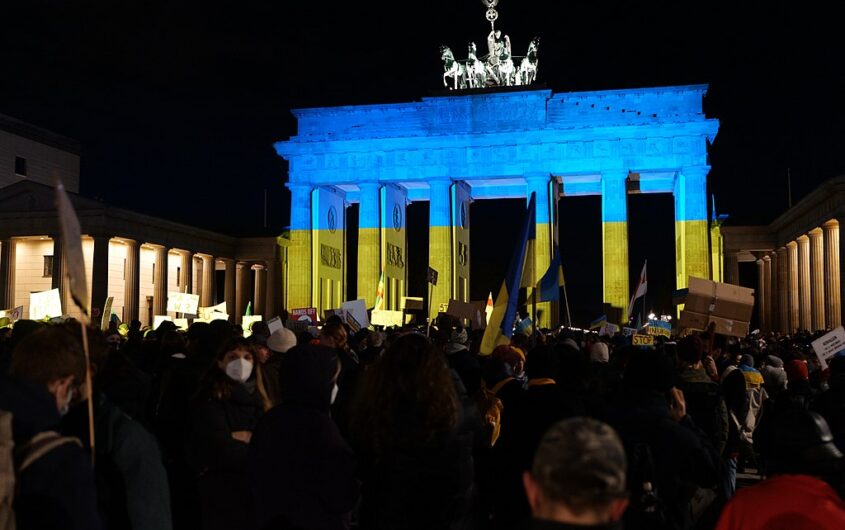
Leonhard Lenz via Wikimedia Commons
Europe Must Stand Firm Supporting Ukraine’s Independence

Dieter Dettke
Georgetown University
Dr. Dieter Dettke is a Non-Resident Fellow at AICGS and Adjunct Professor at Georgetown University.
Dr. Dettke served as the U.S. Representative and Executive Director of the Friedrich Ebert Foundation in Washington from 1985 until 2006 managing a comprehensive program of transatlantic cooperation. In 2006, he joined the German Marshall Fund of the United States as a Transatlantic Fellow and from September 2006 to June 2007, he was a Fellow at the Woodrow Wilson International Center for Scholars. His most recent book is “Germany Says ‘No’: The Iraq War and the Future of German Foreign and Security Policy,” published by theWoodrow Wilson Center Press and The Johns Hopkins University Press, Washington, DC, and Baltimore, 2009.
Dr. Dettke is a foreign and security policy specialist, author and editor of numerous publications on German, European, and U.S. foreign and security issues.
He studied Law and Political Science in Bonn and Berlin, Germany, and Strasbourg, France and was a Fulbright Scholar at the University of Washington in Seattle in 1967/68.
As the Ukraine conflict continues with no end in sight after over one and a half years of fighting, the European determination to stand up against Putin’s war of aggression appears to be weakening. Influential politicians on the left and right openly take Russia’s side in this existential battle for the survival of Ukraine as a free and independent nation. In Germany, the right-wing Alternative for Germany (AfD) as well as representatives of Die Linke (The Left) agitate for peace initiatives that would leave Ukraine divided and stuck in a frozen conflict with Russia in the future. In France and Italy, a similar pattern of right and left voices supporting Russia emerges despite Putin’s war of aggression. Crucial support for Russia, for example, comes from former French President Nicholas Sarkozy as well as from Marine Le Pen’s National Rally. In Italy, the late Silvio Berlusconi and his party always had much sympathy for Putin’s Russia. Europe would put its own integration success story at risk if the EU began reducing its support for Ukraine.
At the core of Russia’s war of aggression against Ukraine is Putin’s attempt to reverse the political order in Europe that emerged after the implosion of the Soviet Union. This new order included the unification of Germany and its membership in NATO as well as the dissolution of the Warsaw Pact. Although this development is seen as a massive loss by Russian nationalist thinkers, it is important to remember that the collapse of the Soviet empire and the dissolution of the Warsaw Pact were not the result of Western warfare or military intervention. The Soviet Union collapsed on Christmas Day 1991 because of its inner contradictions and the vast overextension of Soviet power and control after World War II. It was then-Party Leader Mikhail Gorbachev who ratified the end of the Soviet empire with the stroke of a pen and by resigning as president of the Soviet Union. Before the end of the Soviet Union, in the 1970s, the West had made basic peace arrangements with the USSR, culminating in the 1975 Helsinki Final Act as well as comprehensive arms control and cooperation agreements between the United States and the Soviet Union. These agreements de facto amounted to an ersatz peace treaty for the geographical area reaching from Vancouver to Vladivostok and from Helsinki to Lisbon.
In Putin’s Russia, however, the perception prevails that the demise of the Soviet Union was “the greatest geopolitical catastrophe of the century” and had fostered separatist movements inside Russia. In this view, the West and NATO are responsible for the dissolution of the former Soviet Union. Not unlike Germany’s vengeful behavior after World War I and the draconian stipulations of the Versailles Treaty, Putin’s Russia embarked on a course of rebuilding Russian power in Europe and attempting ultimately to return to great power status on the level of the United States.
A free, sovereign, and independent Ukraine is part of Europe’s fundamental and vital interests.
The crucial question is how to deal with a new Russian empire in case Putin succeeds in taking over Ukraine. In the past, Europe—and in particular Germany—has always been in favor of a European political order that includes Russia rather than isolating or containing it. Even during the Cold War days, when containment was the official Western doctrine, Germany did everything to defuse the hard edges of this strategy, and Ostpolitik opened a comprehensive cooperation strategy. George Kennan predicted that containment would result “either in the breakup or the gradual mellowing of Soviet power.” What happened was exactly what he predicted: the final breakup of the Soviet Union. “Mellowing” of Soviet power was also practiced—unsuccessfully—during the Gorbachev years. But for the Russia that emerged under the leadership of Vladimir Putin, the “mellowing” of Russian power became gradually unacceptable, ushering in a new Russian imperialism. Russian foreign policy took on a distinct anti-Western character. The reason is obvious. The “mellowing” of Russian power and opening the country for cooperation with the West could unleash forces inside Russia threatening Putin’s authoritarian regime.
There is no easy way out of the dilemma Putin created with the war against Ukraine. His aggression created exactly the opposite of what he intended to achieve. Instead of bringing Ukraine back under Russian control, a new sense of national consciousness and independence emerged. The country has now found its true destination: to be part of the community of free, sovereign, and independent nations of Europe, including membership in the European Union and security firmly anchored in the North Atlantic Treaty Organization. A free, sovereign, and independent Ukraine is part of Europe’s fundamental and vital interests. Certainly, such a Ukraine should also be a peaceful neighbor of Russia, but a Ukraine that ends up as a Russian vassal state is not acceptable for Europe.
The new Russian imperialism that would emerge if Putin wins this war would automatically be a counterforce to European integration and transatlantic security structures. Europe’s domestic and international stability would be at risk if Ukraine comes under Russian control. Internationally, one must only look at what Russia is practicing in Africa with the help of the Wagner mercenaries. Putin is creating bridgeheads of authoritarian regimes that then serve Russian interests like in the Central African Republic, Libya, Mali, Sudan, and now even in Niger after the coup in this resource-rich country. The strategic partnership with China, although not a classical alliance, is primarily also designed to develop a powerful anti-Western global strategy. The result of a new Russian imperialism will be a global power struggle between the democratic West and an authoritarian East under the leadership of China and Russia.
A new Russian imperialism would not stop at the borders of Ukraine. With Russian power established in Ukraine, there would be a need to secure the empire with additional control efforts over neighboring states. Neutral states in Russia’s neighborhood such as Moldova and the Western Balkan countries would face Russian pressure. Belarus is already under Russian control, and other countries in the near abroad of Russia would be confronted again with a new security dilemma.
It is time to wake up to the new reality of Russian imperial ambitions and aim for a European order that includes a free and independent Ukraine.
Today, Europe needs to be on the right side of history preserving Western unity and making sure that Ukraine remains part of the community of free and independent states. There is no doubt that this will create an adversarial relationship between Europe and Russia for the foreseeable future. Unlike in the past, Europe and Russia will be unable to bridge their fundamentally different interests. A new era of détente will only be possible with a new Russia, a democratic, non-imperialist Russia willing to cooperate and ultimately ready to join the forces for democratic peace.
Although unlikely now, a democratic and Western-oriented Russia could emerge after Putin. The recent Wagner Group mutiny shows that the fight for a successor to the Putin regime has already started. After the mutiny, Putin decided to eliminate Yevgeny Prigozhin, the leader of the Wagner Group. But the struggle for a new approach to handle the Ukraine conflict will continue. Whether this will go in the direction of a “mellowing” of Russian power is an open question. Europe has a fundamental interest to push in that direction. Everything must be done now to support Ukraine’s course toward a free, sovereign, and independent nation as part of a wider Europe. This includes military support.
Europe should not allow itself to be seduced by falling into the trap of Putin’s cultural familiarity with the West, in particular Germany. Only a short time ago, Russian power reached deep into the center of Europe, occupying one-half of Germany, including Berlin. Most German Putinversteher (Putin sympathizers) simply misunderstand the raw power behind his European strategy based on closeness to Germany. It is time to wake up to the new reality of Russian imperial ambitions and aim for a European order that includes a free and independent Ukraine. From its beginning in the 1950s to the Union of twenty-seven member states today—a Union that can still grow—the European project has been the result of an entirely peaceful process of integration. Today, for the first time, the issue is whether the EU can take the necessary military steps to help protect its stability as a Union in addition to NATO’s security umbrella. This includes weapon deliveries that Ukraine needs and requests for its fight for survival.
Today, Germany is still the second-largest weapon supplier for Ukraine after the United States. But domestic support for sending the necessary arms to Ukraine is far from unanimous. The debate about the Leopard II tank delivery shows that every export issue meets substantial opposition and calls for negotiations. The unofficial German linkage regarding corresponding American initiatives can also create bureaucratic obstacles, reducing military effectiveness. This is not to say that the country is at a tipping point of declining military support for Ukraine. The problem is that the German opposition to military support and premature calls for negotiations are strong enough to encourage Putin’s strategy of achieving control over Ukraine by way of military victory. The issue is hampered, too, by unhelpful considerations of “not provoking Russia.” These considerations must be weighed with their consequences. European inaction and failure to stand firm on the side of Ukraine could lead to the dual catastrophe of Ukraine’s destruction as well as the empowerment of a new Russian imperialism. In that case, Europe’s fundamental interest in preserving the European institutions created after World War II would suffer irreparable damage.









